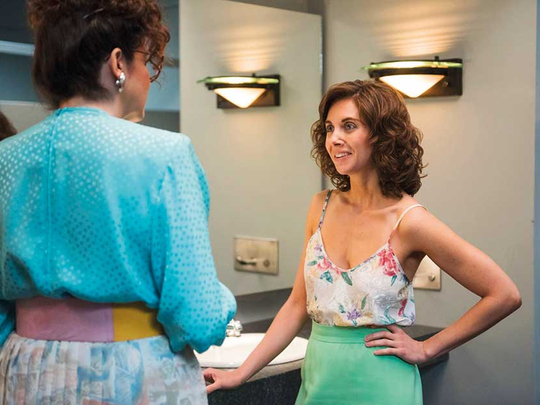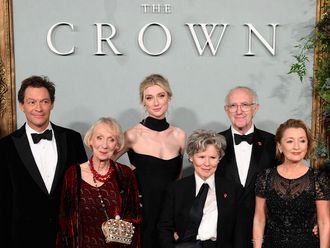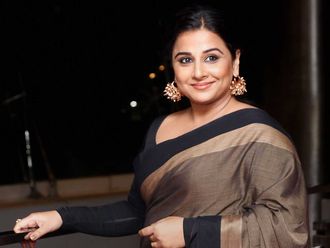
In his 1957 book, Mythologies, the French literary critic Roland Barthes described wrestling as “the spectacle of excess.” It’s not subtle. It’s more storytelling than it is sport. Like ancient theatre, he wrote, it “presents man’s suffering with all the amplification of tragic masks.”
In Netflix’s Glow, the suffering — mostly play-acted — is women’s. So are the body slams, the melodrama and the copious laughs. This 10-episode comedy, arriving on Friday, is a high-flying leap off the top rope, a summer treat with spandex armour and a pulsating neon heart.
Set in 1985 in Los Angeles, Glow is based on Gorgeous Ladies of Wrestling, the real-life league and low-budget TV franchise that sought to cash in on that decade’s wrestlemania. The idea, hot women catfighting, was pure high-concept commerce. (It’s described in a network pitch meeting here as, “Porn you can watch with your kids, finally!”) But Glow turns it into pop art.
Netflix
■ Marc Maron and Chris Lowell in ‘Glow’.
Like many workplace comedies, Glow is about people who had hoped to end up somewhere else. Ruth (Alison Brie) is a serious-minded actress stuck in a rut of reading for, and failing to get, milquetoast secretary roles. (Ruth, a casting director tells her, is the kind of unglamorous artist directors have in mind when they vow to cast “someone who’s real” — then change their minds once they see her.)
She answers a call for “unconventional women” put out by Sam (Marc Maron), a B-movie sci-fi director — his credits include Blood Disco — who’s been hired by a rich young dilettante to cast and create the league.
Ruth struggles to understand the gig; to her, wrestling isn’t acting but “a sport with costumes.” Her breakthrough comes when her estranged best friend, Debbie (Betty Gilpin), a soap actress, turns up at rehearsal and attacks Ruth in the ring. It hits Sam in a flash: He recruits Debbie to be his heroine, or face, and Ruth will be the villain, or heel.
Netflix
■ Ellen Wong and Sunita Mani in ‘Glow’.
Sam initially writes his wrestling show an elaborate, postapocalyptic mythology. His patron, Bash (Chris Lowell), tells him to cut the complicated blah-blah and just give the women outrageous characters and outfits. “Wrestling is not about back story,” he says, “it’s about type.” (Barthes would have agreed: wrestlers, he wrote, “display in advance, in their costumes and attitudes, the future contents of their parts.”)
So each woman ends up cast as a broad stereotype. Arthie (Sunita Mani), an Indian-American medical student, plays Beirut, a terrorist. Tamee (Kia Stevens) becomes Welfare Queen, a personification of Reagan-era race-baiting. Rhonda (Kate Nash) becomes Britannica, the “smartest woman in the world,” identifiable as such because she’s British and smites her opponents with a book.
The characters are smart enough to know how reductive these personas are; Glow is smart enough to show how fiercely owning these roles — which, at least, give women power-bombing agency — can be liberating, even subversive.
Not to mention fun. In the ‘80s-movie tradition, Glow is at heart a scrappy-misfit story, complete with training montages. (One of them is scored, pitch-perfect, to Stan Bush’s Dare, from the 1986 The Transformers: The Movie). Here, the adversary isn’t the rich camp across the lake, but all the forces in Hollywood that keep sharp actresses playing second fiddle to Steve Guttenberg.
At the same time, Glow becomes an insightful story about making art from trash, as an oddball alliance forms between Ruth and Sam. The effervescent Brie finds the fighter underneath Ruth’s artist — her co-stars nickname her “Strindberg” — as she throws herself into building a Russian-villain character. Maron, coming off playing a version of himself on Maron, perfectly inhabits his last-chancer character, who’s sucking on the cigarette-butt end of his career.
The creators of Glow, Liz Flahive and Carly Mensch, were producers on Showtime’s Nurse Jackie, in which Gilpin was a regular. (She’s a delight in Glow, with a gift for physical comedy and a deft handle on Debbie’s pathos.) This series’ tart tone is a lot like that of Jackie, while the big, diverse cast recalls Orange Is the New Black, whose creator, Jenji Kohan, is an executive producer here.
But Glow is blessedly its own thing. It’s nostalgic, but it’s more than the sum of its soundtrack and hairspray. Its ratty mid-80s Los Angeles of motels and skate punks feels specific and lived in. Like last summer’s Netflix breakout, Stranger Things, Glow is a hulking creature sewn together from pop-cultural scraps, but when it steps into the ring, it reveals itself as a true original.
Don’t miss it
Glow is now streaming on Netflix.













